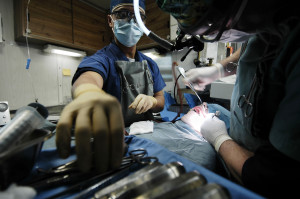 When we think of oral surgery, we typically think of tooth extractions. After all, the majority of people need to get their wisdom teeth removed so it makes sense that our minds would gravitate toward this very common practice. But there are a number of other types of oral surgery that can change the lives of patients. In a previous blogpost, I spoke about corrective jaw surgery, and this is just one of the many forms of oral surgery that can be performed. Here is a list of all of the most common types of oral surgery and what a patient can expect from these surgeries:
When we think of oral surgery, we typically think of tooth extractions. After all, the majority of people need to get their wisdom teeth removed so it makes sense that our minds would gravitate toward this very common practice. But there are a number of other types of oral surgery that can change the lives of patients. In a previous blogpost, I spoke about corrective jaw surgery, and this is just one of the many forms of oral surgery that can be performed. Here is a list of all of the most common types of oral surgery and what a patient can expect from these surgeries:
Impacted Wisdom Teeth
Wisdom teeth are the third molars, and they are the last to develop. While sometimes these teeth may erupt normally without any issues, more often than not, issues do occur. The problem is either that the teeth don’t fully erupt or that they aren’t properly aligned. This leads the teeth to become impacted between the gums and the jawbone. As a result, these teeth need to be surgically removed.
Reconstructive Surgery
If your teeth have been knocked out or you are suffered some other kind of facial injuries, even everyday functions like eating can become difficult. Reconstructive surgery can help to replace damaged or missing teeth, correct jaw joint problems, or treat jawbone and gum damage.
Dental Implants
A dental implant is the process of replacing a missing tooth. During this surgery, a metal post will be implanted into the jawbone. This will fuse the bone and the gum tissue over time, making a strong foundation on which to place an artificial tooth or crown. If you’re looking for a long-term treatment for tooth loss, dental implants are a great idea and the end product looks just like a real tooth.
Jaw Surgery
If your jaws aren’t properly aligned, this can cause a number of problems. These issues are not only with your appearance but also with the functions of your jaws. In order to restore function and fix misaligned jaws, surgery is often required.
Biopsies
If you have a suspicious-looking lesion in your mouth, you will likely have to get a biopsy to check for oral cancer. This will involve the removal of a small piece of tissue. This piece of tissue will then be sent to a lab for analysis.
Sleep Apnea Treatment
Serious sleep apnea sufferers may require surgery. One form of surgery to help those with sleep apnea is to remove excess tissue from the back of the throat in order to reduce symptoms by a significant amount.
Oral surgery is a common process that can fix a number of functional problems. If you are looking to get oral surgery, make sure to first consult with the surgeon so that you can ask any questions you may have. You will also be able to discuss anesthesia options and all of the ways you need to prepare. Oral surgeons better the lives of many patients through a number of different surgeries.
